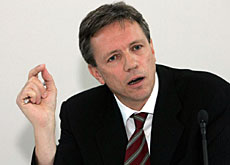Mobile-phone tariffs set to remain high

A lack of competition means that mobile-phone charges are higher in Switzerland than in most other European countries – and they are set to stay that way.
The three Swiss mobile-phone operators – Swisscom, Orange and Sunrise – have captured the market and are reluctant to allow anyone else a foothold.
These three firms were awarded their concessions by the Federal Communications Office and can’t be compelled to allow other providers access to the existing infrastructure.
Britain and other European countries have taken a different route. They gave priority to firms offering services using the networks of existing mobile-phone operators. These firms are known as Mobile Virtual Network Operators (MVNOs).
MVNOs play a very active part in the market and have led to increased competition among providers. As a result mobile-phone charges have fallen much faster and to a lower level than in Switzerland.
Tele2, a Europe-wide provider of telecoms services, operates as a MVNO in Denmark, the Netherlands, Austria, Norway and now also in France.
“We would have liked to offer our services in Switzerland too,” Tele2 Swiss business manager Roman Schwarz told swissinfo. “But the three existing providers didn’t show the slightest interest.”
Instead Tele2 acquired a mobile-telephony licence and set up a mobile network in Zurich. The firm now wants to set up networks in other Swiss cities.
Tele2 then hopes to connect its city networks through national roaming, by using the networks of Swiss operators. But so far no agreement has been reached.
“When the new negotiations start on mobile-telephony concessions we will be pressing for commitments to national roaming to be realised,” said Schwarz.
Concessions
The ten-year concessions granted to existing providers will expire in 2008, though they will have to apply for a renewal of their licence two years earlier.
“Then the licences already granted will either be renegotiated or we will cancel the existing licences and open up a new competition,” said Peter Bär of the Communications Office.
The Communications Office wants to increase competition within the sector, but at present cannot or will not say how it intends to do this.
Swisscom spokesman Christian Neuhaus said his firm was clearly opposed to increased state regulation.
One of those in favour of breaking the grip of the big three Swiss operators is parliamentarian Josef Zisyadis. He submitted a motion on the renewal of GSM (Global System for Mobile Communications) licences in the House of Representatives.
The motion demands the granting of national roaming at cost-orientated prices, so that new providers can quickly build up their networks. It also calls for the licensing of MVNOs, which would be entitled to use existing networks.
Zisyadis is convinced these measures would drive down the rates currently paid by consumers. A welcome side-effect would be that it would stop the proliferation of aerials, he says.
The outcome of negotiations on mobile-telephony concessions cannot be predicted. But whatever happens it seems certain that Swiss consumers will have to wait until 2008 before they see prices start to fall.
swissinfo, Etienne Strebel
According to the Federal Communications Office:
In the area of mobile telephony, market penetration is around 87%.
Leading telecoms provider Swisscom enjoys a market share of 61%.
In second place is Sunrise with 21.3% .
In third place is Orange with 17.7%.

In compliance with the JTI standards
More: SWI swissinfo.ch certified by the Journalism Trust Initiative


You can find an overview of ongoing debates with our journalists here . Please join us!
If you want to start a conversation about a topic raised in this article or want to report factual errors, email us at english@swissinfo.ch.